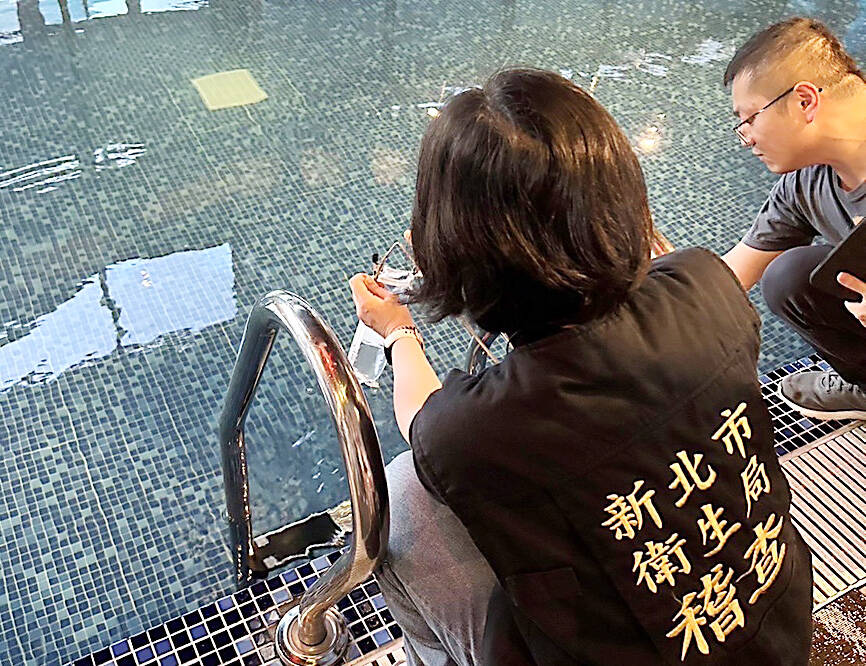A woman in northern Taiwan has died from a rare brain-eating amoeba, marking the nation’s first death from Naegleria fowleri in 12 years, health authorities said on Wednesday.
Experts urged against public alarm, saying the amoeba is susceptible to chlorine and does not spread easily.
Traces of Naegleria fowleri were found in the woman who died of meningitis, Centers for Disease Control (CDC) Deputy Director-General Tseng Shu-huai (曾淑慧) told a news briefing in Taipei.

Photo courtesy of the New Taipei City Department of Health
Infection caused by the rare microbe is 99 percent fatal, she said, adding that only two cases have ever been confirmed in Taiwan.
An indoor water park in New Taipei City that the woman had visited is being tested for Naegleria fowleri, she said.
The process could take between one and three weeks, as scientists have limited experience with the amoeba.
Samples taken from the park are being condensed for polymerase chain reaction tests and positive results would then be genetically sequenced, she said.
The pathogen dwells in fresh water, prefers high temperatures, can survive in heat of up to 46°C and briefly survive in temperatures higher than that, the CDC said.
This means the germ can be found in rivers, lakes, warm water discharged from factories, insufficiently chlorinated swimming pools and soil, it said.
People engaging in activities in or near bodies of water can be infected by inhaling droplets containing the amoeba, which then spread from the olfactory nerves to the brain, the CDC said.
The microbes cannot be spread by drinking contaminated water or via human contact, it said.
The incubation period for these germs varies from one to seven days, with symptoms including headache, fever, nausea, vomiting, neck stiffness, muscle spasms, altered psychological states, delusions and loss of consciousness, the CDC said.
People should try to avoid getting water in their nostrils when visiting hot springs or engaging in watersports, and should avoid immersing their heads or disturbing mud in the bottom of lakes or rivers, it said.
People who display symptoms of meningitis after playing in water should seek medical help immediately and disclose their contact history, the CDC said.
Hwang Kao-pin (黃高彬), deputy head of the infectious disease department at China Medical University in Taichung, yesterday told a news conference that the threat from Naegleria fowleri is limited.
Chlorine added to tap water and swimming pools neutralizes the amoeba, which is highly unlikely to be found in groundwater, he said, adding that surface water bodies are the main source of danger.
The microorganism poses a relatively higher risk to hot spring-goers due to their ability to withstand temperatures of up to 50°C, Huang said.
Brain infections caused by the amoeba are nearly impossible to cure, as it does not respond to antibiotics and diagnosis often comes too late, he said, adding that only one type of antifungal is known to have an effect.
Additional reporting by CNA

INVESTIGATION: The case is the latest instance of a DPP figure being implicated in an espionage network accused of allegedly leaking information to Chinese intelligence Democratic Progressive Party (DPP) member Ho Jen-chieh (何仁傑) was detained and held incommunicado yesterday on suspicion of spying for China during his tenure as assistant to then-minister of foreign affairs Joseph Wu (吳釗燮). The Taipei District Prosecutors’ Office said Ho was implicated during its investigation into alleged spying activities by former Presidential Office consultant Wu Shang-yu (吳尚雨). Prosecutors said there is reason to believe Ho breached the National Security Act (國家安全法) by leaking classified Ministry of Foreign Affairs information to Chinese intelligence. Following interrogation, prosecutors petitioned the Taipei District Court to detain Ho, citing concerns over potential collusion or tampering of evidence. The

TRADE: The premier pledged safeguards on ‘Made in Taiwan’ labeling, anti-dumping measures and stricter export controls to strengthen its position in trade talks Products labeled “made in Taiwan” must be genuinely made in Taiwan, Premier Cho Jung-tai (卓榮泰) said yesterday, vowing to enforce strict safeguards against “origin laundering” and initiate anti-dumping investigations to prevent China dumping its products in Taiwan. Cho made the remarks in a discussion session with representatives from industries in Kaohsiung. In response to the US government’s recent announcement of “reciprocal” tariffs on its trading partners, President William Lai (賴清德) and Cho last week began a series of consultations with industry leaders nationwide to gather feedback and address concerns. Taiwanese and US officials held a videoconference on Friday evening to discuss the

NEGOTIATIONS: The US response to the countermeasures and plans Taiwan presented has been positive, including boosting procurement and investment, the president said Taiwan is included in the first group for trade negotiations with the US, President William Lai (賴清德) said yesterday, as he seeks to shield Taiwanese exporters from a 32 percent tariff. In Washington, US Trade Representative Jamieson Greer said in an interview on Fox News on Thursday that he would speak to his Taiwanese and Israeli counterparts yesterday about tariffs after holding a long discussion with the Vietnamese earlier. US President Donald Trump on Wednesday postponed punishing levies on multiple trade partners, including Taiwan, for three months after trillions of US dollars were wiped off global markets. He has maintained a 10 percent

PERSONAL DATA: The implicated KMT members allegedly compiled their petitions by copying names from party lists without the consent of the people concerned Judicial authorities searched six locations yesterday and questioned six people, including one elderly Chinese Nationalist Party (KMT) member and five KMT Youth League associates, about alleged signature forgery and fraud relating to their recall efforts against two Democratic Progressive Party (DPP) legislators. After launching a probe into alleged signature forgery and related fraud in the KMT’s recall effort, prosecutors received a number of complaints, including about one petition that had 1,748 signatures of voters whose family members said they had already passed away, and also voters who said they did not approve the use of their name, Taipei Deputy Chief Prosecutor